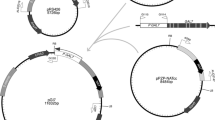Summary
Strain 35 of variety 2 ofParamecium aurelia is homozygous for a gene,t, which prevents animals from multiplying at temperatures above 29°C. Other strains are resistant to temperatures of 29–34°C., however, and strain 30 was shown to be homozygous for the allele for temperature resistanceT.T is completely dominant overt. Whentt is changed toTt at conjugation no detectable delay in the time of action of the gene can be seen, but the nature of the experiments is such that a delay in action of up to two or three fissions could not be detected. WhenTt is changed tott at autogamy, 5–9 fissions are required before the influence ofT disappears. TheTT andtt phenotypes are described.
Similar content being viewed by others
References
Dippell, R. (1954). A preliminary report on the chromosomal constitution of certain variety 4 races ofParamecium aurelia.Caryologia, Suppl.,6, Pt 2, 1109–1111.
Preer, J. R.,Jr. (1948). A study of some properties of the cytoplasmic factor, ‘kappa’, inParamecium aurelia, variety 2.Genetics,33, 349–404.
Sonneborn, T. M. (1950). Methods in the general biology and genetics ofP. aurelia.J. exp. Zool. 113, 87–148.
Author information
Authors and Affiliations
Additional information
This work wag supported by a grant from Psi Beta Psi Sorority.
Rights and permissions
About this article
Cite this article
Preer, J.R. A gene determining temperature sensitivity inParamecium . J Genet 55, 375–378 (1957). https://doi.org/10.1007/BF02981650
Received:
Issue Date:
DOI: https://doi.org/10.1007/BF02981650




